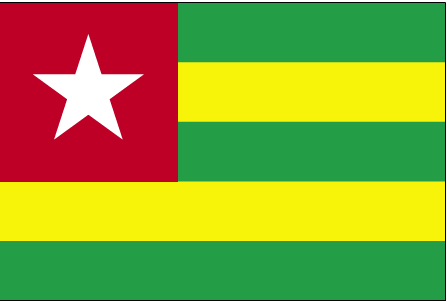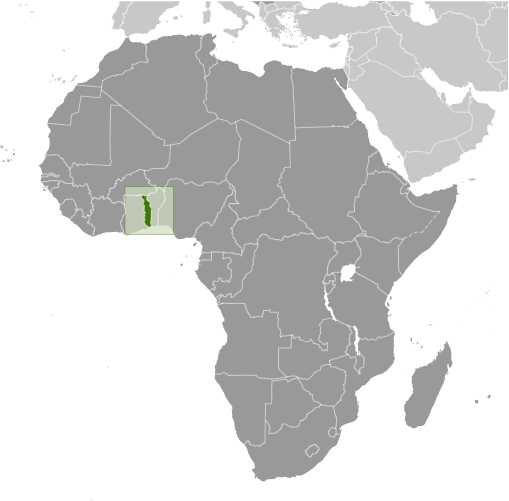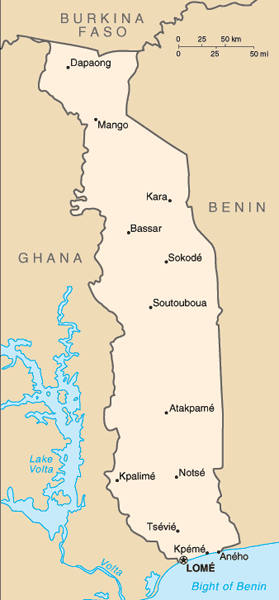French Togoland became Togo in 1960. Gen. Gnassingbe EYADEMA, installed as military ruler in 1967, ruled Togo with a heavy hand for almost four decades. Despite the facade of multiparty elections instituted in the early 1990s, the government was largely dominated by President EYADEMA, whose Rally of the Togolese People (RPT) party has maintained power almost continually since 1967 and maintains a majority of seats in today's legislature. Upon EYADEMA's death in February 2005, the military installed the president's son, Faure GNASSINGBE, and then engineered his formal election two months later. Democratic gains since then allowed Togo to hold its first relatively free and fair legislative elections in October 2007. After years of political unrest and condemnation from international organizations for human rights abuses, Togo is finally being re-welcomed into the international community.
Population
6,199,841
Country comparison to the world:104
note:estimates for this country explicitly take into account the effects of excess mortality due to AIDS; this can result in lower life expectancy, higher infant mortality, higher death rates, lower population growth rates, and changes in the distribution of population by age and sex than would otherwise be expected (July 2010 est.)
Nationality
Noun:Togolese (singular and plural)
Adjective:Togolese
Ethnic groups
African (37 tribes; largest and most important are Ewe, Mina, and Kabre) 99%, European and Syrian-Lebanese less than 1%
Religions
Christian 29%, Muslim 20%, indigenous beliefs 51%
Languages
French (official and the language of commerce), Ewe and Mina (the two major African languages in the south), Kabye (sometimes spelled Kabiye) and Dagomba (the two major African languages in the north)
Country Name
Conventional long form:Togolese Republic
Conventional short form:Togo
Local long form:Republique togolaise
Local short form:none
Former:French Togoland
Government Type
republic under transition to multiparty democratic rule
Capital
Name:Lome
Geographic coordinates:6 08 N, 1 13 E
Time difference:UTC 0 (5 hours ahead of Washington, DC during Standard Time)
Administrative divisions
5 regions (regions, singular - region); Centrale, Kara, Maritime, Plateaux, Savanes
Independence
27 April 1960 (from French-administered UN trusteeship)
National Holiday
Independence Day, 27 April (1960)
Constitution
adopted by public referendum 27 September 1992
Legal system
French-based court system; accepts compulsory ICJ jurisdiction with reservations
Suffrage
18 years of age; universal (adult)
Executive branch
Chief of state:President Faure GNASSINGBE (since 4 May 2005);
Head of government:Prime Minister Gilbert HOUNGBO (since 7 September 2008)
Cabinet:Council of Ministers appointed by the president and the prime minister
(For more information visit the World Leaders website)
Elections:president elected by popular vote for a five-year term (no term limits); election last held on 4 March 2010 (next to be held in 2015); prime minister appointed by the president
Election results:Faure GNASSINGBE reelected president; percent of vote - Faure GNASSINGBE 60.9%, Jean-Pierre FABRE 33.9%, Yawovi AGBOYIBO 3%, other 2.2%
Legislative branch
unicameral National Assembly (81 seats; members elected by popular vote to serve five-year terms)
Elections:last held on 14 October 2007 (next to be held in 2012)
Election results:percent of vote by party - RPT 39.4%, UFC 37.0%, CAR 8.2%, independents 2.5%, other 12.9%; seats by party - RPT 50, UFC 27, CAR 4
Judicial branch
Court of Appeal or Cour d'Appel; Supreme Court or Cour Supreme
Political Parties and Leaders
Action Committee for Renewal or CAR [Yawovi AGBOYIBO]; Democratic Convention of African Peoples or CDPA; Democratic Party for Renewal or PDR; Juvento [Monsilia DJATO]; Movement of the Believers of Peace and Equality or MOCEP; Pan-African Patriotic Convergence or CPP; Rally for the Support for Development and Democracy or RSDD [Harry OLYMPIO]; Rally of the Togolese People or RPT [Faure GNASSINGBE]; Socialist Pact for Renewal or PSR; Union for Democracy and Social Progress or UDPS [Gagou KOKOU]; Union of Forces for a Change or UFC [Gilchrist OLYMPIO]
Political pressure groups and leaders
NA
International organization participation
ACP, AfDB, AU, ECOWAS, Entente, FAO, FZ, G-77, IAEA, IBRD, ICAO, ICC, ICRM, IDA, IDB, IFAD, IFC, IFRCS, ILO, IMF, IMO, Interpol, IOC, IOM, IPU, ISO (correspondent), ITSO, ITU, ITUC, MIGA, MINURCAT, NAM, OIC, OIF, OPCW, PCA, UN, UNAMID, UNCTAD, UNESCO, UNIDO, UNMIL, UNOCI, UNWTO, UPU, WADB (regional), WAEMU, WCO, WFTU, WHO, WIPO, WMO, WTO
Diplomatic representation in the US
Chief of mission:Ambassador Kadangha Limbiya BARIKI
Chancery:2208 Massachusetts Avenue NW, Washington, DC 20008
Telephone:[1] (202) 234-4212
FAX:[1] (202) 232-3190
Diplomatic representation from the US
Chief of mission: Ambassador Patricia McMahon HAWKINS
Embassy:4332 Blvd. Gnassingbe Eyadema, Cite OUA, Lome
Mailing address:B. P. 852, Lome; 2300 Lome Place, Washington, DC 20512-2300
Telephone:[228] 261-5470
FAX:[228] 261-5501
Flag description
five equal horizontal bands of green (top and bottom) alternating with yellow; a white five-pointed star on a red square is in the upper hoist-side corner; the five horizontal stripes stand for the five different regions of the country; the red square is meant to express the loyalty and patriotism of the people; green symbolizes hope, fertility, and agriculture; yellow represents mineral wealth and faith that hard work and strength will bring prosperity; the star symbolizes life, purity, peace, dignity, and Togo's independence
note: uses the popular Pan-African colors of Ethiopia










